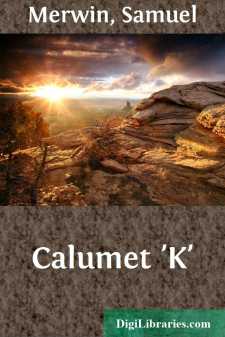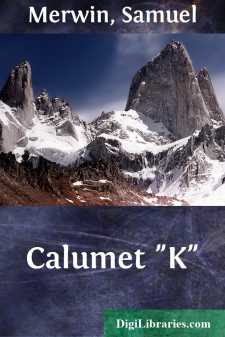Categories
- Antiques & Collectibles 13
- Architecture 36
- Art 48
- Bibles 22
- Biography & Autobiography 813
- Body, Mind & Spirit 142
- Business & Economics 28
- Children's Books 14
- Children's Fiction 11
- Computers 4
- Cooking 94
- Crafts & Hobbies 4
- Drama 346
- Education 46
- Family & Relationships 57
- Fiction 11829
- Games 19
- Gardening 17
- Health & Fitness 34
- History 1377
- House & Home 1
- Humor 147
- Juvenile Fiction 1873
- Juvenile Nonfiction 202
- Language Arts & Disciplines 88
- Law 16
- Literary Collections 686
- Literary Criticism 179
- Mathematics 13
- Medical 41
- Music 40
- Nature 179
- Non-Classifiable 1768
- Performing Arts 7
- Periodicals 1453
- Philosophy 64
- Photography 2
- Poetry 896
- Political Science 203
- Psychology 42
- Reference 154
- Religion 513
- Science 126
- Self-Help 84
- Social Science 81
- Sports & Recreation 34
- Study Aids 3
- Technology & Engineering 59
- Transportation 23
- Travel 463
- True Crime 29
Calumet 'K'
by: Samuel Merwin
Categories:
Description:
Excerpt
The contract for the two million bushel grain elevator, Calumet K, had been let to MacBride & Company, of Minneapolis, in January, but the superstructure was not begun until late in May, and at the end of October it was still far from completion. Ill luck had attended Peterson, the constructor, especially since August. MacBride, the head of the firm, disliked unlucky men, and at the end of three months his patience gave out, and he telegraphed Charlie Bannon to leave the job he was completing at Duluth and report at once at the home office.
Rumors of the way things were going at Calumet under the hands of his younger co-laborer had reached Bannon, and he was not greatly surprised when MacBride told him to go to Chicago Sunday night and supersede Peterson.
At ten o'clock Monday morning, Bannon, looking out through the dusty window of the trolley car, caught sight of the elevator, the naked cribbing of its huge bins looming high above the huddled shanties and lumber piles about it. A few minutes later he was walking along a rickety plank sidewalk which seemed to lead in a general direction toward the elevator. The sidewalks at Calumet are at the theoretical grade of the district, that is, about five feet above the actual level of the ground. In winter and spring they are necessary causeways above seas of mud, but in dry weather every one abandons them, to walk straight to his destination over the uninterrupted flats. Bannon set down his hand bag to button has ulster, for the wind was driving clouds of smoke and stinging dust and an occasional grimy snowflake out of the northwest. Then he sprang down from the sidewalk and made his way through the intervening bogs and, heedless of the shouts of the brakemen, over a freight train which was creaking its endless length across his path, to the elevator site.
The elevator lay back from the river about sixty yards and parallel to it. Between was the main line of the C. & S. C., four clear tracks unbroken by switch or siding. On the wharf, along with a big pile of timber, was the beginning of a small spouting house, to be connected with the main elevator by a belt gallery above the C. & S. C. tracks. A hundred yards to the westward, up the river, the Belt Line tracks crossed the river and the C. & S. C. right of way at an oblique angle, and sent two side tracks lengthwise through the middle of the elevator and a third along the south side, that is, the side away from the river.
Bannon glanced over the lay of the land, looked more particularly at the long ranges of timber to be used for framing the cupola, and then asked a passing workman the way to the office. He frowned at the wretched shanty, evidently an abandoned Belt Line section house, which Peterson used for headquarters. Then, setting down his bag just outside the door, he went in.
"Where's the boss?" he asked.
The occupant of the office, a clerk, looked up impatiently, and spoke in a tone reserved to discourage seekers for work.
"He ain't here. Out on the job somewhere."
"Palatial office you've got," Bannon commented. "It would help those windows to have'em ploughed." He brought his bag into the office and kicked it under a desk, then began turning over a stack of blue prints that lay, weighted down with a coupling pin, on the table.
"I guess I can find Peterson for you if you want to see him," said the clerk.
"Don't worry about my finding him," came from Bannon, deep in his study of the plans. A moment later he went out.
A gang of laborers was engaged in moving the timbers back from the railroad siding....




